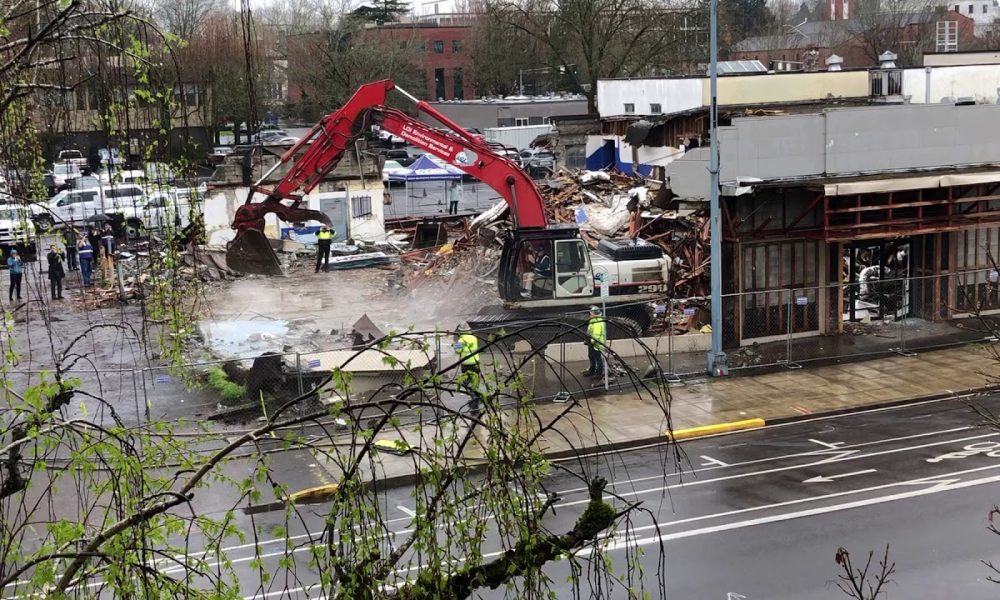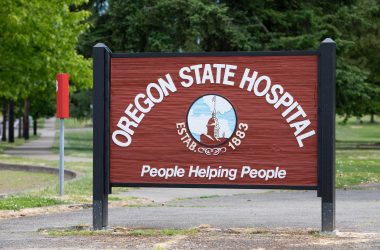
Sen. Peter Courtney topples a wall at the former Greyhound station on Church Street in downtown Salem on April 1, 2019 (Courtesy/Center for Hope and Safety)
With affordable housing scarce in Salem, the Center for Hope and Safety is looking to become a landlord.
The center, a 46-year-old nonprofit serving survivors of domestic violence and sexual assault, is planning to build a $10 million, three-story apartment complex with retail and business space on the ground floor in the next three years.
Survivors of domestic violence in Salem often stay at the nonprofit’s emergency shelter after fleeing from an abuser.
But increasingly, staff find that people who are safe and working to rebuild their lives after domestic violence don’t have a place to go from the shelter.
“Affordable housing right now is not affordable for (most of) the folks coming out of the shelter,” said Jayne Downing, center executive director. “They’re starting over from nothing.”
As a result, the average stay in the shelter has tripled to 40 days over the past six years, she said.

Jayne Downing, executive director of the Center for Hope and Safety, stands in the building’s office. (Rachel Alexander/Salem Reporter)
Domestic violence is a common cause of homelessness in Salem.
Four in 10 homeless Salem women and nearly one-quarter of all homeless people reported they were fleeing domestic violence, according to client data collected by ARCHES Project staff from October 2016 through the end of 2018.
Three-quarters of homeless women said they had experienced domestic violence at some point in their lives.
Downing said the paths through which domestic violence leads to homelessness or financial problems vary.
“Sometimes the abuser hasn’t let them work,” she said. Abusers often hurt a victim’s financial stability by taking money or wracking up debt in a victim’s name.
The project, called HOPE Plaza, got its start in 2015, when the Center bought the former Greyhound station on Northeast Church Street Northeast, next door to its existing headquarters, for $650,000.
Now that the building’s paid off, the next step is underway: demolition.
Gov. Kate Brown took a ceremonial first swing at the decrepit building last week, and Sen. Peter Courtney knocked down a wall Monday. Crews will be working to haul away the old building through April 15, Downing said.
The new building won’t be completed until 2022, she said. The nonprofit is asking the Legislature for a $2.5 million grant from state lottery funds. It is also working with Sen. Jeff Merkley, Sen. Ron Wyden Rep. Kurt Schrader to obtain $2.5 million in federal funds.
The top two floors will be a mix of 20 studio and one- and two-bedroom apartments. Staff are still figuring out rents, but anticipate having a mix of tenants with federal housing vouchers and offering sliding scale rent based on income to some survivors who don’t qualify for vouchers.
Current plans would have tenants spending about 20 to 30 percent of their income on rent, depending on the unit.
The building’s ground floor would have room for stores or small businesses. Downing said those businesses would receive below-market rent in exchange for offering services to the tenants like job training, classes or discounted services.
Some units will be designed for renters who need up to two years of help to become independent. Others could rent indefinitely.
Downing said the plan to start construction in 2021, and the nonprofit meantime will secure in-kind support, driving construction costs down, and raise community donations to cover the remaining cost.
In addition to government funding, the Center has about $1 million raised, she said, and a bank willing to offer construction financing.
Downing said she’s heard many people in Salem saw “we can’t just build our way out” of an affordable housing shortage. She wants HOPE Plaza to go beyond providing housing through on-site services and integration with businesses so people can become self-sufficient again.
“What we hope is this could be a model for other nonprofits,” she said.
Reporter Rachel Alexander: [email protected] or 503-575-1241.
Follow Salem Reporter on FACEBOOK and on TWITTER.
SUBSCRIBE TO SALEM REPORTER — For $10 a month, you hire our entire news team to work for you all month digging out the news of Salem and state government. You get breaking news alerts, emailed newsletters and around-the-clock access to our stories. We depend on subscribers to pay for in-depth, accurate news. Help us grow and get better with your subscription. Sign up HERE.

Rachel Alexander is Salem Reporter’s managing editor. She joined Salem Reporter when it was founded in 2018 and covers city news, education, nonprofits and a little bit of everything else. She’s been a journalist in Oregon and Washington for a decade. Outside of work, she’s a skater and board member with Salem’s Cherry City Roller Derby and can often be found with her nose buried in a book.









